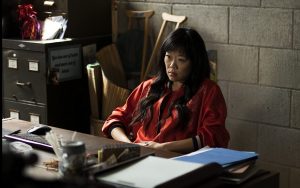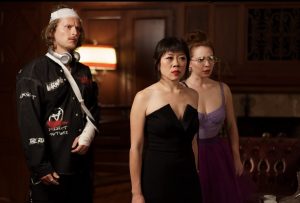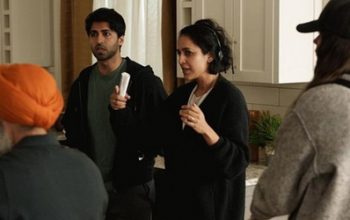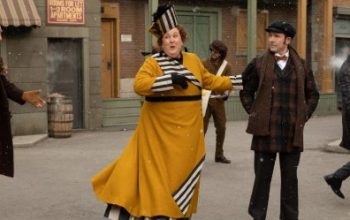One of the new homegrown Canadian shows of 2023 is Citytv’s Wong & Winchester, a six-episode procedural that’s a little bit Private Eyes and a little bit Pretty Hard Cases. It premiered in January and all six episodes are now streaming on Citytv and Prime Video in Canada, and I recently caught up with series stars Grace Lynn Kung (Sort Of, Mary Kills People) and Sofia Banzhaf (The Communist’s Daughter) to talk about the show.
In the series, Kung is Marissa Wong, a former cop turned private investigator who’s burned through several drivers before her partner Gary (Joe Cobden), assigns his niece, Sarah Winchester (Banzhaf), to ferry her around, given that the Marissa has lost her driver’s license. Marissa bristles at the overly eager and idealistic Sarah until she realizes that her sunny disposition is an excellent balance for her more jaded world view when it comes to investigating – and even just talking to – people.
While the two women are initially oil and water together, Kung says that’s part of the magic of the formula, and reflective of how people often come together in real life. “This is a thing about relationships. Sure, it’s a bit of a court-mandated friendship, but doesn’t mean it’s not a good idea. I think that’s a pretty universal experience, having someone in your life and you don’t fit together, but eventually through time you bring out the best in each other,” she shares.
“It doesn’t mean people aren’t allowed to have sharp edges, but the synergy between the two really works well. That’s kind of at the heart of the show and how they actually end up solving the crimes.”
Banzhaf says they had to stay on their toes to remember where that relationship was at any given time due to the way they filmed. “We were block shooting the whole show, so one of the biggest challenges is really tracking that relationship from episode to episode. And it would be a lot of backtracking before scenes [to] just quickly get up to speed again about where we are,” she explains.
“We’d talk to the writer, the creator, Hollis Ludlow-Carroll, who was on set with us. Sometimes we’d shoot up to five episodes in a day and so there was just really a lot of ‘Let’s remember exactly where we are in this journey because that is going to be the thing that is gonna be the most interesting thing to track for an audience and the most exciting for us as actors to lean into.”
Kung is appreciative that the show allows Marissa to be human, not perfect. “What I love about Marissa, that I think is super important and fun, is I love to see messy, real human beings, people who are not quintessentially likable. I think that that cult of likability is actually super destructive and makes a difficult space for people to exist in, mental healthwise and all of that,” she explains.
“And I just love to see people who are not really getting it together. I had a friend who wrote, and his sister-in-law is Asian and she said, ‘I just love to see Marissa. It’s so great to see an Asian who doesn’t have their life together, who’s a mess. And then I feel I have more breathing space in my life.’ We’re seeing a bit of a role model in Marissa.”
“[And] why shouldn’t that be the case? She has a very innate sense of justice, what’s right and wrong, and it’s almost why the world is difficult for her because it should be this way and people should just act this way and we shouldn’t have time for the niceties … all the things that juxtapose Marissa and Sarah.”
“The world needs all of those shades in between. And so I really love representation-wise just for people to see that existing, and [for the show] to be centered around a lead who we don’t usually get to see as our protagonist.”
In terms of the changing landscape of television, and seemingly more representative programming, Kung explains that it’s a complicated and amorphous topic. “Change is difficult to put your finger on, and I guess the question is, ‘From where does the power stem, and has that changed much,” she says.
“Because it feels at its core, if you are not at that little point of power where you have influence over what’s being developed, how it’s getting developed, it’s difficult to see the trickle down of whether or not that’s actually changing things, unless it’s tokenistic and sometimes that’s harmful.”
“We’re people who grew up always having to empathize through someone who didn’t have the experiences that [we] had or that [we] had to translate. For it to be the other way around is nice. And that stuff really means something to me. Whether or not it’s things changing, that’s a little bit difficult to say because we’re not always in those rooms of influence.”
“I think just the fact that we get to fight for the things that we feel really matter [is significant]. Sofia and I really fought to keep a scene in the second episode where Sarah’s purse gets stolen and then we get it back. Because of time constraints and all of that, we were thinking we were maybe going to drop that scene.”
“And Sofia and I went to our team and said, ‘We know that things are tight, we’re flying at a breakneck pace, but this feels integral to their relationship, integral for people following us. If we’re going to lose anything, we cannot lose this one. We ended up shooting it and I think both of us felt that was a huge thing for us to have as characters.”
With Pretty Hard Cases just ending and Spencer Sisters just launching, Wong & Winchester is in good company as a female-led procedural, and both actresses are grateful for the expanded opportunities, but would also like to get to a point where that’s not such an anomaly.
“When we started the show, the Spencer Sisters wasn’t out yet and Pretty Hard Cases had just started its second season. But it’s interesting how the zeitgeist is sort of all happening at the same time. I do think that it’s really nice because in my experience I often feel there’s room for only one woman of a certain age, or race or [identity], all of those things, in a project,” Banzhaf points out.
“So there is kind of this feeling of always being in competition with other women. That is one of the worst things about being a female actor, honestly. With this, I was so happy that we did away with that. There’s a feeling [now] of, ‘No, actually there’s room for all of us and we don’t have to all be this tokenistic one of a kind and then you can only have one of you and so everyone else has to be a different gender or whatever.'”
“I do hope that that is changing, but again, it’s kind of hard to tell whether something is truly changing or whether it’s a trend that’s sort of passing through. Obviously I’m hoping that it’s not just a phase.”
“It [would be] great to get to a point where it’s just a show about different things [and] these individuals who get to be whatever they are. The labeling sometimes continues to be boxing,” adds Kung. “In the end, when you’ve got something in the style that we’re doing it, sometimes it’s absurd and sometimes it isn’t, at the core it’s between these two women. It’s between Marissa and Sarah and Sofia and I, and that is hopefully the pin around which the chaos and the tornado is going.”
“Hopefully, people enjoy spending time with the two of us, the two of our characters, and seeing how these two people who are very different, but maybe not that different, develop [a] relationship … that’s [something that’s fun to watch] across all themes … romantic, platonic, and adventures in life.”
Wong & Winchester is streaming now on CityTV and Prime Canada.
Photos and Video Courtesy of Citytv.







One thought on “Grace Lynn Kung and Sofia Banzhaf Talk Wong & Winchester”